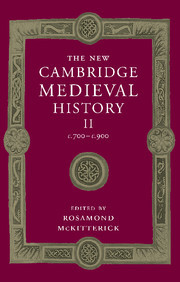Description
The New Cambridge Medieval History: Volume 2, c.700–c.900
The New Cambridge Medieval History Series
Coordinator: McKitterick Rosamond
A comprehensive account of European medieval history from c.700–c.900.
Language: English
Subject for The New Cambridge Medieval History: Volume 2, c.700–c.900:
Publication date: 05-2015
Support: Print on demand
Support: Print on demand
Description
/li>Contents
/li>
This volume of The New Cambridge Medieval History covers most of the period of Frankish and Carolingian dominance in western Europe. Adopting an interdisciplinary approach, the authors consider developments in Europe as a whole, from Ireland to the Bosphorus and Iceland to Gibraltar. The chapters offer an examination of the interaction between rulers and ruled, of how power and authority actually worked, and of the impact of these on the society and culture of Europe as a whole. The volume is divided into four parts. Part I encompasses the events and political developments in the whole of the British Isles, the west and east Frankish kingdoms, Scandinavia, the Slavic and Balkan regions, Spain, Italy, and those aspects of Byzantine and Muslim history which impinged on the west between c.700 and c.900. Parts II, III and IV cover common themes and topics within the general categories of government and institutions, the church and society, and cultural and intellectual development.
Part I. Political Development: 1. Introduction: sources and interpretation Rosamond McKitterick; 2. The British Isles a) England 700–900 Simon Keynes; The British Isles b) Ireland, Wales and Scotland, c.700 to the early eleventh century Donnchadh O Corrain; The British Isles c) England and the Continent Rosamond McKitterick; 3. Frankish Gaul to 814 Paul Fouracre; 4. The Frankish kingdoms 814–898: the west Janet L. Nelson; 5. The Frankish kingdoms 817–911: the east and middle kingdoms Johannes Fried; 6. Fines imperii: the marches Julia M. H. Smith; 7. The Vikings in Francia and Anglo-Saxon England to 911 Simon Coupland; 8. Scandinavia, c.700–1066 Neils Lund; 9. Slavs and Bulgars Jonathan Shepard; 10. The Muslims in Europe Hugh Kennedy; 11. Spain: the northern kingdoms and the Basques, 711–910 Roger Collins; 12. Lombard and Carolingian Italy Paolo Delogu; 13. Byzantine Italy, c.680–c.876 T. S. Brown; 14. Byzantium and the West Michael McCormick; Part II. Government and Institutions: 15. Kingship and royal government Janet L. Nelson; 16. The aristocracy Stuart Airlie; 17. Social and military institutions Hans-Werner Goetz; 18. Economic organization Adriaan Verhulst; 19. Rural Society in Carolingian Europe C. J. Wickham; 20. Money and coinage Mark Blackburn; Part III. Church and Society: 21. The papacy in the eighth and ninth centuries Thomas F. X. Noble; 22. The organisation, law and liturgy of the western church, 700–900 Roger E. Reynolds; 23. Carolingian monasticism: the power of prayer Mayke de Jong; 24. Religion and lay society Julia M. H. Smith; Part IV. Cultural and Intellectual Developments: 25. Eighth-century foundations Rosamond McKitterick; 26. Language and communication in Carolingian Europe Michel Banniard; 27. The Carolingian Renaissance: education and literary culture John J. Contreni; 28. Theology and the organisation of thought David Ganz; 29. Book production in the Carolingian empire and the spread of Caroline minuscule David Ganz; 30. Art and architecture Laurence Nees; Conclusion Rosamond McKitterick
© 2024 LAVOISIER S.A.S.




